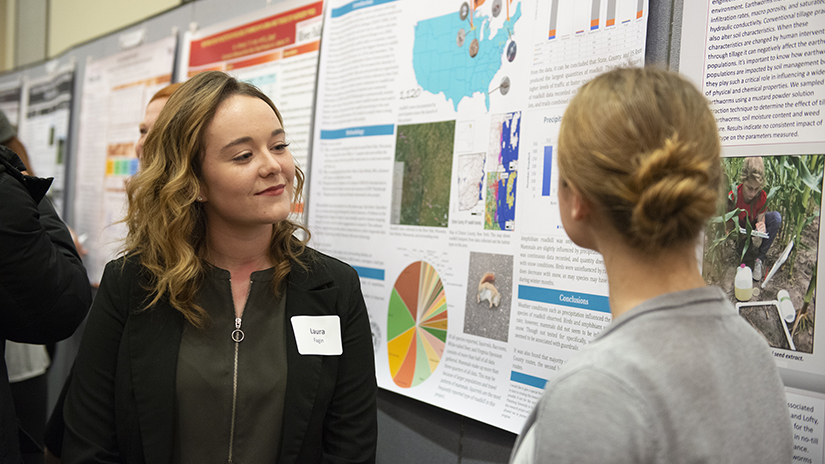UNIVERSITY OF WISCONSIN River Falls
Chancellor's Blog
More than research
Friday, Dec. 14, 2018 | Dean Van Galen
What could an accounting major from Rochester, Minn., gain from studying the health care system of Slovenia? Just ask University of Wisconsin-River Falls student Kristy Strain who spent the fall interviewing individuals and organizations in Slovenia on the Semester Abroad: Europe program. Not only did the research experience help Kristy become more knowledgeable about one of her passions – international health care – it also gave her the opportunity to gain critical professional skills and intercultural competencies that will serve her well in the future.
Kristy was just one of many enthusiastic UW-River Falls undergraduates who presented their research or scholarship at a major campus event earlier this week, the annual Fall URSCA Gala. URSCA stands for Undergraduate Research, Scholarly and Creative Activity, an inclusive definition demonstrating our commitment to encouraging participation of undergraduates from every major on campus.
Growing the number of students engaged in URSCA activities has been a high priority for UW-River Falls since the adoption of our current strategic plan, Pathway to Distinction, in 2012. With the creation of the URSCA office in 2013, we have been able to provide dedicated support for students and their faculty mentors to engage in these activities. I am confident that we are well on the way towards our stated goal to be among the national leaders in undergraduate and collaborative research, scholarship and creative activity. We have indeed seen remarkable progress. In 2011, 39 students presented their undergraduate research at the fall gala. This year that number was 350, an all-time high, with a record 1,331 people in attendance. During the 2012-13 academic year, students from six different academic departments participated in undergraduate research—this year that number rose to 24, almost every academic department on campus.
While statistics can be interesting, what was inspiring at the URSCA Gala was talking to our students about their projects. They were knowledgeable, articulate, and passionate, presenting the results of studies on topics ranging from the effects of brewery wastewater on maize, to the use of state-of-the-art machines learning to map facial expression; from the influential women of Spain over the past five centuries, to the analysis of roadkill data to identify vehicle-animal collision “hotspots” in Wisconsin. There were also student artists, performers, robot programmers and rocket designers – all sharing the outcomes of their URSCA work.
Why is research, scholarly and creative activity such a valuable part of the undergraduate experience? Certainly, it fosters new knowledge, discoveries and creative outputs, which is in and of itself significant. Indeed, much of the work from the URSCA Gala will also be published or presented at state or national conferences. While that is important, it is not the only reason why these experiences are so meaningful. It’s really about what students learn through the process…how to envision, define and structure a project, building critical thinking skills, understanding research ethics, developing resiliency when things don’t work, honing their written and oral communication skills, and fostering creativity and innovation. In some cases, students are addressing "real world" issues or challenges that extend beyond the campus. I know that many of the students at the URSCA Gala on Tuesday are now motivated to continue their academic careers by pursuing a graduate degree in a field related to their project.
There is one more aspect of URSCA that is important: the critical role of faculty. Many students tell me of the commitment of their faculty mentor in supporting their project (another reminder that faculty at a university such as UWRF do much more than teach classes!). URSCA is indeed one of the best ways to encourage strong student-faculty engagement, a crucial element of student success.
Speaking with our students reminded me of how my own undergraduate research experience at UW-Whitewater impacted me as a first-generation college student. Although the scientific results of my biochemical research were modest, thanks to my supportive mentor Dr. Phil Johns, the experience helped me develop the confidence and skills that would ultimately inspire me to pursue a Ph.D. and become a professor. Later, I too had the joy of mentoring my own undergraduates on projects, helping them to grow as young professionals while also building relationships that have turned into lasting friendships.
The experiences of our students with their UW-River Falls faculty seem to be no different. As I hear repeatedly from our alumni, the role that our faculty and instructors played in mentoring and supporting them on URSCA and other activities has often resulted in special connections with life-long impacts. So, to members of the UWRF community who take the time and invest the effort in supporting URSCA on our campus: thank you! You are providing extraordinary experiences for our students. To the students reading this: if you are considering getting involved in URSCA, I enthusiastically encourage you to do so! You won’t regret it.












